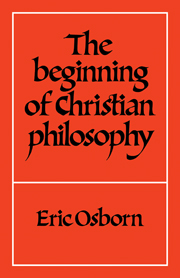Book contents
- Frontmatter
- Contents
- PREFACE
- REFERENCES
- ABBREVIATIONS
- 1 CHRISTIAN ARGUMENT
- 2 PEOPLE AND PLACES
- 3 THE GOD ABOVE
- 4 THE RATIONAL LAUGHING ANIMAL
- 5 COSMOS AND CREATION
- 6 HISTORY
- 7 THE SHORT WORD
- CONCLUSION
- APPENDIX
- BIBLIOGRAPHY
- INDEX OF BIBLICAL CITATIONS
- INDEX OF CITATIONS FROM ANCIENT AUTHORS
- INDEX OF CITATIONS FROM MODERN AUTHORS
- GENERAL INDEX
- Frontmatter
- Contents
- PREFACE
- REFERENCES
- ABBREVIATIONS
- 1 CHRISTIAN ARGUMENT
- 2 PEOPLE AND PLACES
- 3 THE GOD ABOVE
- 4 THE RATIONAL LAUGHING ANIMAL
- 5 COSMOS AND CREATION
- 6 HISTORY
- 7 THE SHORT WORD
- CONCLUSION
- APPENDIX
- BIBLIOGRAPHY
- INDEX OF BIBLICAL CITATIONS
- INDEX OF CITATIONS FROM ANCIENT AUTHORS
- INDEX OF CITATIONS FROM MODERN AUTHORS
- GENERAL INDEX
Summary
Problems
The problems of one ineffable transcendent God group themselves around the idea of a first cause. The persistence of this idea, with all its difficulties, has been sometimes seen as a ground for its acceptance. In the second century, a strong monistic tendency was not peculiar to Christians; but they were able to make good use of it. In recent discussion, logical objections to the first cause are tempered by an appreciation of the question as a religious problem. Everything has a point of ultimate dependence, as Augustine found at Ostia: ‘if one could hear them, all these things are saying, “We did not make ourselves, but he who made us is he who abides to eternity”’ [Conf. 9.10].
Man and his freedom showed the link between God and man and the need for God to change human life, while keeping it human. The term ‘deification’ was important because it pointed to the gift of immortality as something that could not be taken for granted. Freedom was seen to be more important than free will because it was concerned with a fullness of life that, unlike self-fulfilment, found its centre in the cross of Jesus.
The world and history go together, for the world belongs to a God of hope, who opens the future and gives meaning to history; he is the suffering God, known supremely in the cross of his Son and the death of the martyrs.
- Type
- Chapter
- Information
- The Beginning of Christian Philosophy , pp. 258 - 272Publisher: Cambridge University PressPrint publication year: 1981



